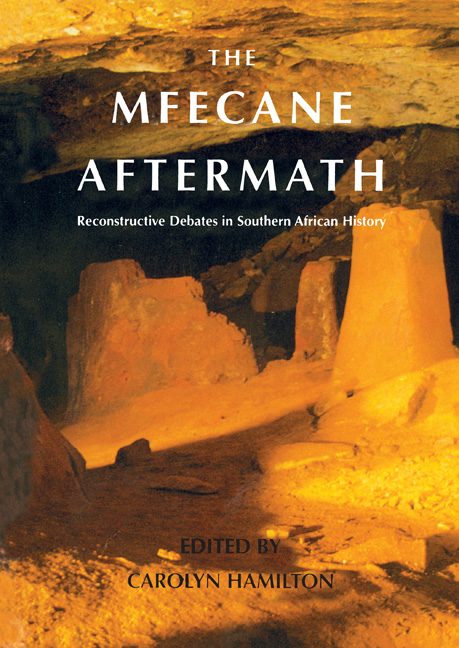Book contents
- Frontmatter
- Contents
- Maps
- Preface
- Acknowledgements
- Notes on Orthography and Names
- Contributors
- Introduction
- Part One Historiography and Methodology
- Part Two The South-Eastern Coastal Region
- Beyond the Concept of the ‘Zulu Explosion’ Comments on the Current Debate
- 5 Sources of Conflict in Southern Africa c. 1800-1830: The ‘Mfecane’ Reconsidered
- 6 Political Transformations in the Thukela-Mzimkhulu Region in the Late Eighteenth and Early Nineteenth Centuries
- 7 The Character and Objects of Chaka’: A Reconsideration of the Making of Shaka as Mfecane Motor
- 8 Matiwane's Road to Mbholompo: A Reprieve for the Mfecane?
- 9 Unmasking the Fingo: The War of 1835 Revisited
- 10 The Mfecane Survives its Critics
- Part Three The Interior
- Glossary
- Abbreviations
- Bibliographer's Note
- Bibliography
- Complete List of Papers Presented at the Colloquium
- Index
5 - Sources of Conflict in Southern Africa c. 1800-1830: The ‘Mfecane’ Reconsidered
from Part Two - The South-Eastern Coastal Region
Published online by Cambridge University Press: 31 May 2019
- Frontmatter
- Contents
- Maps
- Preface
- Acknowledgements
- Notes on Orthography and Names
- Contributors
- Introduction
- Part One Historiography and Methodology
- Part Two The South-Eastern Coastal Region
- Beyond the Concept of the ‘Zulu Explosion’ Comments on the Current Debate
- 5 Sources of Conflict in Southern Africa c. 1800-1830: The ‘Mfecane’ Reconsidered
- 6 Political Transformations in the Thukela-Mzimkhulu Region in the Late Eighteenth and Early Nineteenth Centuries
- 7 The Character and Objects of Chaka’: A Reconsideration of the Making of Shaka as Mfecane Motor
- 8 Matiwane's Road to Mbholompo: A Reprieve for the Mfecane?
- 9 Unmasking the Fingo: The War of 1835 Revisited
- 10 The Mfecane Survives its Critics
- Part Three The Interior
- Glossary
- Abbreviations
- Bibliographer's Note
- Bibliography
- Complete List of Papers Presented at the Colloquium
- Index
Summary
During the 1820s the entire region of southern Africa was affected directly or indirectly by tremendous demographic upheaval and revolutionary social and political change. The period was marked by massive migrations, sporadic raids and battles, and frequent periods of privation and famine for many people in the region. This ‘mfecane’ has been explained in many ways by historians, but never adequately. The sociopolitical changes and associated demographic turmoil and violence of the early nineteenth century in southern Africa were the result of a complex interaction between factors governed by the physical environment and local patterns of economic and political organisation.
Increasing inequalities within and between societies coupled with a series of environmental crises at the beginning of the nineteenth century transformed long-standing competition over natural resources and trade in south-eastern Africa into violent struggles for dominance and survival. Trade at Delagoa Bay, involving primarily the export of ivory, had allowed some Africans to accumulate wealth and consolidate power, leading to political amalgamation at the expense of the weak. Increasing political inequality between chiefdoms and increasing socioeconomic inequality within societies made weaker people, with fewer entitlements to food, more vulnerable to famine in times of drought-induced food scarcity. When the area was struck by severe droughts and other ecological problems in the first two decades of the nineteenth century, competition became keen over fertile, well-watered land. Those who had already consolidated their power prevailed over weaker groups in the open contests that emerged. The weak found themselves incorporated into the lower echelons of stronger societies, either conquered involuntarily or submitting voluntarily for the sake of survival. The stage was set for the emergence of various strong leaders, some, like Shaka, who ruled with terror and others, like Moshoeshoe, who won the voluntary devotion of their followers.
The resulting period of state formation, often involving initial stages of conquest by force, was prolonged into two decades of violence because of the activities of Europeans encroaching from both east and west. In the east, slave traders found a new supply of ready victims in the area around Delagoa Bay and fostered continued violence to meet their demands for slaves.
- Type
- Chapter
- Information
- Mfecane AftermathReconstructive Debates in Southern African History, pp. 123 - 162Publisher: Wits University PressPrint publication year: 1995



